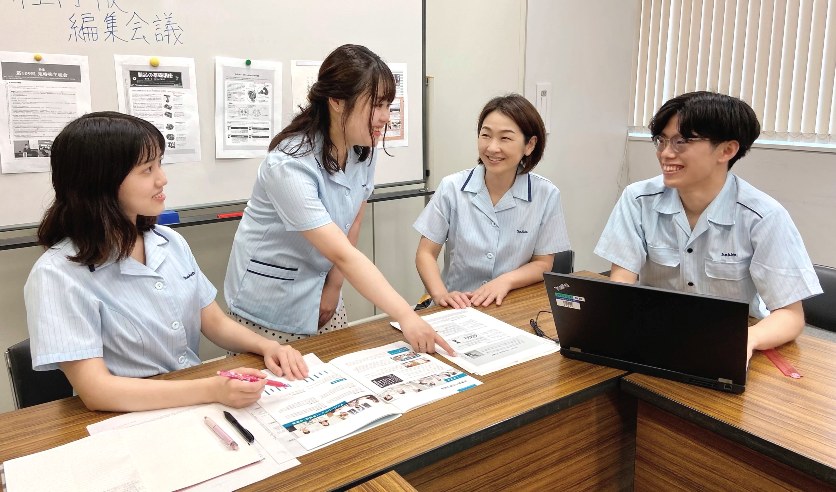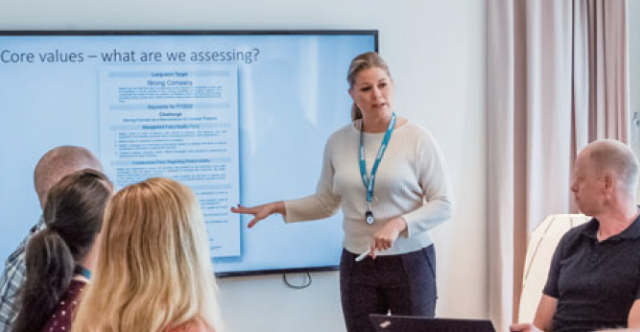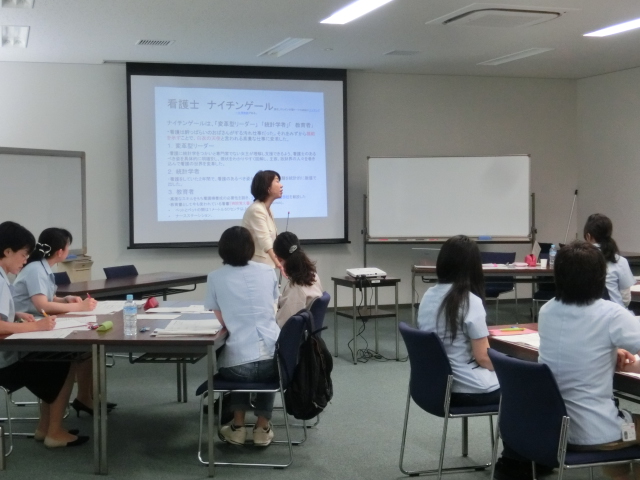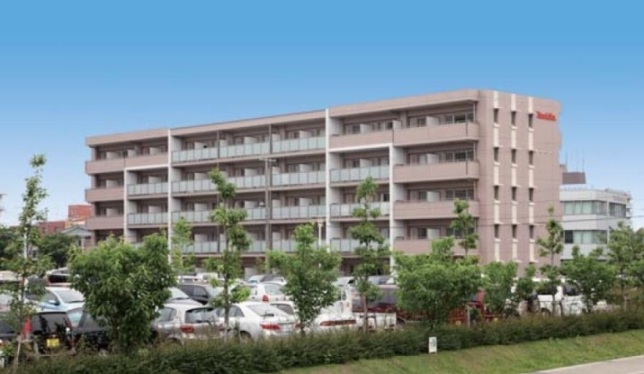Non-financial Information(ESG)
Approaches to Employees / Respect for Human Rights
Fostering Human Resources
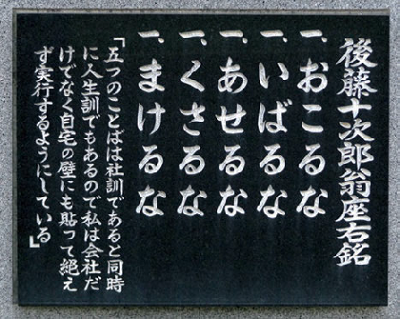
What supports our growth is nothing other than the talents of the people working at Makita. Based on“If employees are constantly angry at each other, work won’t progress smoothly (don’t be angry).
Managers should advise and talk to employees in a persuasive manner (don’t be arrogant).
One must not panic in the face of difficult conditions, such as a declining economy or problems with work (don’t panic), or must not mope in such conditions (don’t mope).
Panicking and engaging in excessive competition is like signing one’s own death sentence. That doesn’t mean, however, that one should be lax. If you fail, that will be the least productive course of action (don’t give up).” , these life teachings of Jujiro Goto, who helped build the foundation of Makita Corporation together with its founder, Mosaburo Makita, changing it to a “power tool corporation,” we are providing employees with the opportunity to demonstrate their ability to the fullest.
For training programs, we carry out stratified training (tailored to match each employee’s career stage), correspondence training, as well as overseas job training actively offered to young employees to experience local workplaces through on-the-job training in order to allow our workers to build up professional skills as we foster human resources capable of being active on a global stage. Furthermore, we are striving to cultivate human resources in each global region, which includes carrying out problem-solving training and manager training to boost leadership skills at the China plant.
In addition, employees in Japan regularly set targets at the beginning of each fiscal year and meet with their supervisors at least twice a year to discuss the targets and results. Through feedback given by supervisors in interviews, human resource development is conducted. Semiannual results are reflected in bonuses, and the results of the past year are reflected in base pay. By doing so, employee motivation is increased.
Diversity Promotion
Makita strives to create a workplace that gives diverse employees a sense of purpose and a secure environment for their professional activity.
Increasing Presence of Female Workers
At Makita, we believe that it is essential to be a company that allows all employees to actively work and exercise their talents to the maximum degree, regardless of gender. The Makita Group focuses on the gender equality in every aspect of the personnel management from hiring to allocation and promotion. We seek to ensure a fair personnel policy and work environment including the child-rearing leave system and shorter working hours system for child-rearing so that women can work actively with peace of mind. Thanks to these gender equality efforts, the average tenure of female employees in Japan is more or less the same as that of their male counterparts. Moreover, for further promotion of female workers, the Group has rolled out a training program to inspire our female workers to design their careers and the next steps in their lives. Participants in the program were asked to explore their strengths, weaknesses, and value priorities, design their own careers, and identify the challenges that need to be solved so they become key to success.
At present, the Makita Group has more than 190 women in management positions actively supporting our global business in many divisions. Going forward, we will continue ensuring workplaces and environments conducive to the peace of mind of our employees.
Women in management positions actively supporting our global business
Women's career design training
Hiring of Foreign Employees
Approximately 80% of Makita Group employees are hired overseas and international students are also hired in Japan. Additionally, as a company that emphasizes a local, on-site business philosophy, we have, for many years, placed weight on diverse employees who can localize our business practices. Evidence of this is in the active contributions of employees with foreign nationality, including employees of overseas subsidiaries having been promoted to corporate officer positions at Makita Corporation.
Hiring of People with Disabilities
As of June 1, 2021, the proportion of people with disabilities employed by the Company fell slightly below the mandatory proportion set by the government. However, we will strive to increase and maintain this rate by employing new graduates and mid-career workers in FYE2022.
Hiring of the Elderly
We offer re-employment until age 65 for employees who have reached the mandatory retirement age of 60, but who wish to continue working. Currently, approximately 80% of our retirement age employees wish to be re-employed, and we offer opportunities for many employees to remain active. As of April 1, 2021, 218 employees have been re-employed through this offer.
Ensuring Employee-friendly Workplaces
In order to allow diverse employees to pursue their career with a sense of purpose, we offer a work environment that includes a childcare leave system, a childcare reduced working hours system, as well as other programs as part of our active efforts to facilitate work-life balance.
Childcare Leave System
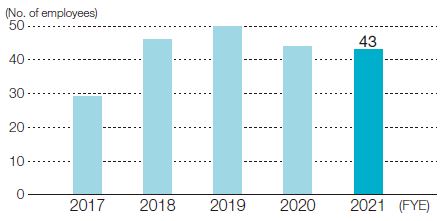
We introduced a childcare leave system in 1990 and use of this system remains stable, with employees commonly taking childcare leave twice or more. In FYE 2021, 43 employees used childcare leave (including four male employees) and we achieved a 100% return rate, with 21 out of 21 employees who took leave returning to work.
Childcare Reduced Working Hours System
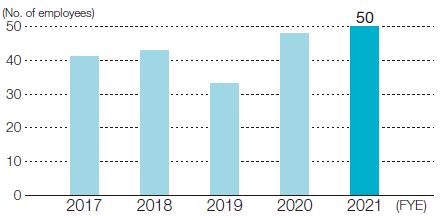
The childcare reduced working-hours system for childcare that we introduced in 1992 has also become a well-established system. It was used by 50 employees (including two male employees) in FYE 2021.
Welfare Program
In order for each and every employee to work energetically, we believe it is essential to establish a welfare system that supports a comfortable working environment and satisfying lifestyles. Therefore, we have enhanced our welfare system in a variety of aspects. In addition to social insurance for all regular employees, we provide bachelors’ dormitories and company housing, as well as an employee stockholding association and corporate-type defined contribution pension plan to support their asset building.
| Bonus |
Twice a year (June/December) |
| Pay raise |
Once a year (April) |
| Leave |
Annual paid leave (20 days), multipurpose leave, congratulatory or condolence leave, maternity leave, invigoration leave, refreshment leave, childcare leave, nursing care leave, etc. |
| Insurance |
Health insurance, employees’ pension insurance, employment insurance, worker’s accident compensation insurance, etc. |
| Systems |
Employee stockholding association, property accumulation savings, corporate-type defined contribution pension plan, regular investment, home loan, Makita corporate pension fund, mutual aid association, group insurance, culture/sports/recreational activities, support for correspondence education, etc. |
| Housing, etc. |
Bachelors’ dormitories, company housing, contracted recreational facilities, etc. |
Dormitory Sumiyoshi (dormitory for singles)
Securing Safety and Health of Employees
Makita’s Safety and Health Committee members carry out regular patrols at each of our business bases in Japan. The Safety and Health Committee reports the results of those patrols and supports improvement measures for safer and healthier worksites. Additionally, following plans from the Safety and Health Committee, each worksite engages in activities to preemptively prevent occupational accidents. Furthermore, in terms of employee health, we provide influenza shots in house, while the Okazaki Plant has distributed Makita cordless fan jackets and also set up water coolers to help deal with hot weather. Through these and other efforts, we are striving to improve the work environment and ensure the health of employees Company-wide.
As preventative countermeasures against COVID-19, we are encouraging all employees to check their temperature every morning and wash their hands, while also wearing a mask from the time they leave home in the morning to when they return in the evening, and avoiding unessential business trips and meetings. If an employee develops a fever, cough, or other signs of feeling unwell, we ask that they refrain from coming to work and we increase ventilation and sanitize shared spaces. We will continue trying to ensure the safety and health of customers, employees, and their families as we maintain our business activities and take ample measures to prevent the spread of infections.
Personnel data
Makita Corporation (Non-Consolidated)
|
FYE2017 |
FYE2018 |
FYE2019 |
FYE2020 |
FYE2021
|
| Number of employees |
2,853 |
2,877 |
2,906 |
2,958 |
3,086
|
(Male employees) |
(2,325) |
(2,343) |
(2,359) |
(2,387) |
(2,497)
|
(Female employees) |
(528) |
(534) |
(547) |
(571) |
(589)
|
| Average years of service |
18.3 |
18.5 |
18.3 |
17.8 |
17.1
|
(Male employees) |
(18.5) |
(18.7) |
(18.5) |
(18.0) |
(17.2)
|
(Female employees) |
(17.5) |
(17.6) |
(17.4) |
(17.1) |
(16.8)
|
| Turnover rate within 3 years of employment |
13.0% |
8.0% |
13.4% |
4.2% |
12.1%
|
| Number of labor union members* |
2,629 |
2,650 |
2,664 |
2,717 |
2,832
|
*Except for those who are not eligible to join the labor union, such as those in managerial positions, all employees are members of the union.
Consolidated (Employee ratio by region)
|
FYE2017 |
FYE2018 |
FYE2019 |
FYE2020 |
FYE2021
|
| Japan |
19% |
18% |
18% |
18% |
17%
|
| Europe |
19% |
20% |
23% |
23% |
25%
|
| North America |
6% |
6% |
6% |
6% |
6%
|
| Asia |
48% |
48% |
45% |
45% |
44%
|
| Other regions |
8% |
8% |
8% |
8% |
8%
|
Respect for Human Rights
Guidelines to the Code of Ethics for Makita, which outline the conduct expected of all Group Directors and employees, clearly recognize “respect for human rights” and stipulate the importance of respecting all fundamental human rights and prohibiting discrimination and conduct that harms individual dignity. All employees, including part-time employees, are provided with information and training about the Guidelines to the Code of Ethics once a year without fail. This also covers overseas subsidiaries and we thoroughly emphasize respect for human rights across the entire Group.
Furthermore, since we believe that it is important to fulfill our social responsibility for recognizing human rights not just ourselves but alongside all of the businesses in our supply chain, the Guidelines to the Code of Ethics for Makita also stipulate that fulfillment of social responsibility and respect for human rights (including working to eliminate child labor and forced labor) are selection criteria for business partners.
In addition, as a business operator that conducts business in the United Kingdom as well, we report on our group's efforts to prevent slave labor and human trafficking under the UK's Modern Slavery Act 2015.
